Report on Establishing Self-Directed Recovery Relationships
VerifiedAdded on 2021/02/19
|12
|4390
|32
Report
AI Summary
This report delves into the concept of self-directed recovery within the mental healthcare sector, emphasizing the individual's ability to lead a fulfilling life despite mental illness. It covers legal and ethical considerations, including codes of practice, discrimination, duty of care, and informed consent. The report also explores values and principles such as recovery, empowerment, and social justice, alongside historical, contemporary, and emergent models of mental illness in Australia. Evidence-based recovery practices, including psycho-education and skill training, are discussed, as well as key programs, supports, and services available to individuals with mental illness. Finally, the report highlights the importance of reflective practice and effective communication techniques like motivational interviewing in fostering successful recovery relationships.
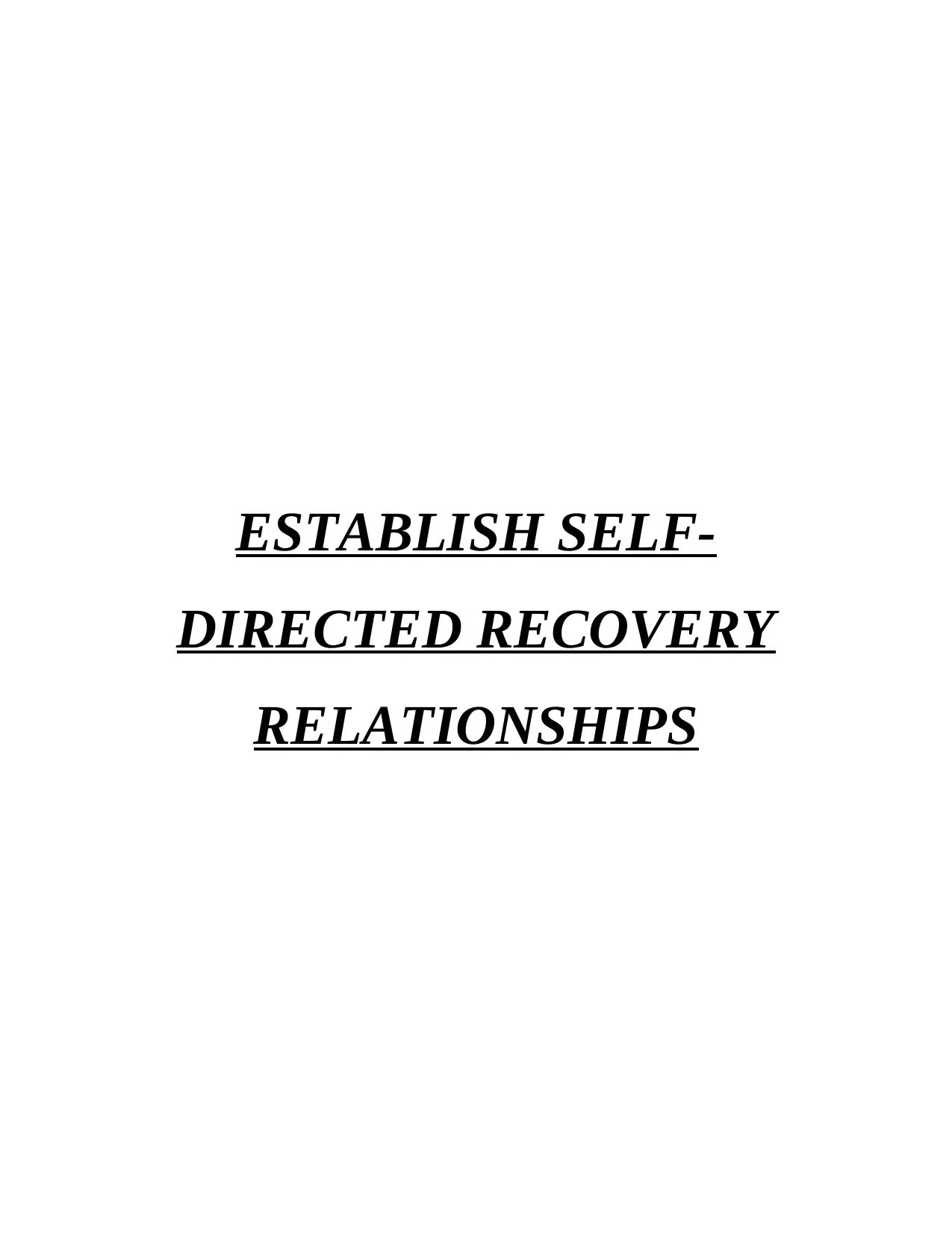
ESTABLISH SELF-
DIRECTED RECOVERY
RELATIONSHIPS
DIRECTED RECOVERY
RELATIONSHIPS
Paraphrase This Document
Need a fresh take? Get an instant paraphrase of this document with our AI Paraphraser
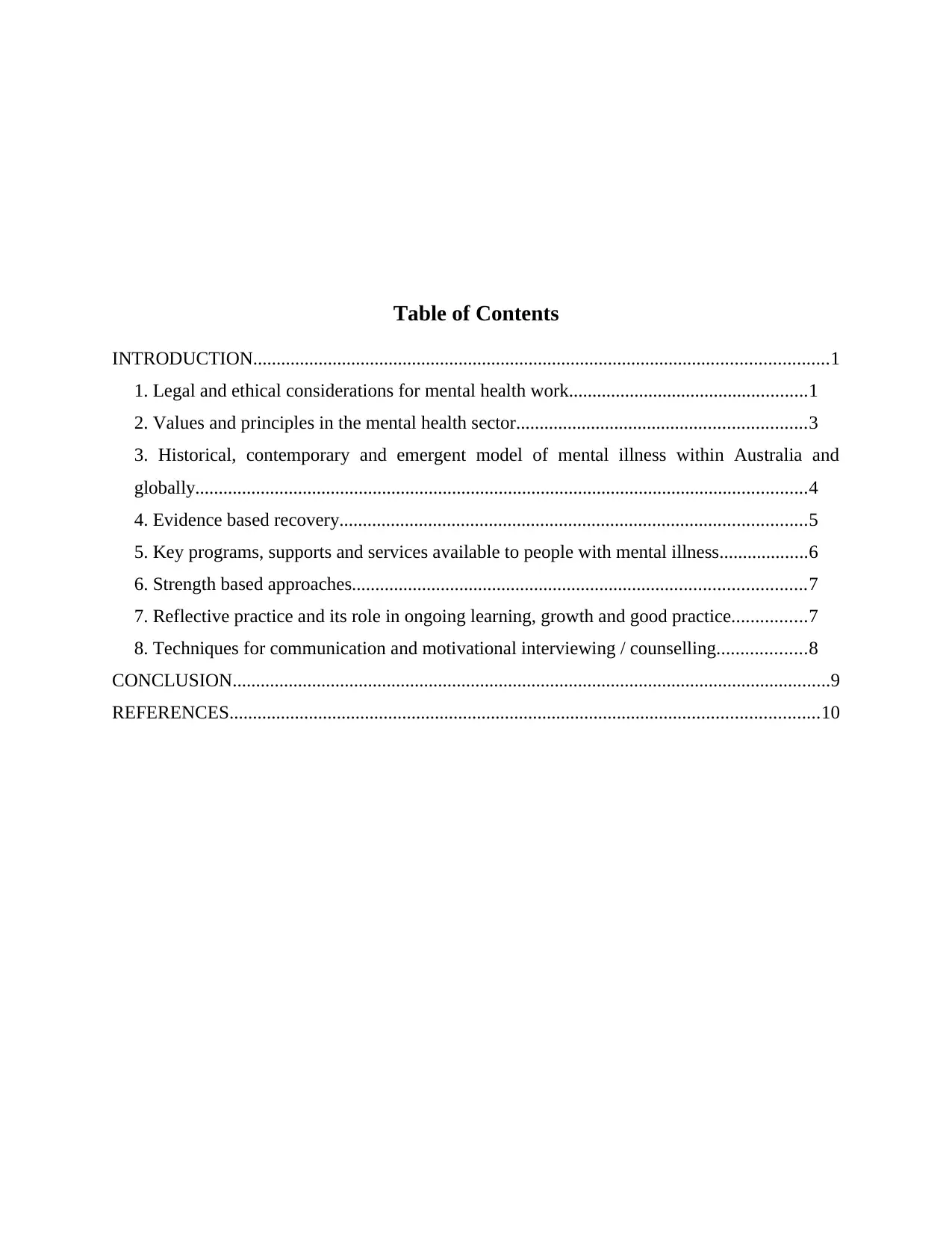
Table of Contents
INTRODUCTION...........................................................................................................................1
1. Legal and ethical considerations for mental health work...................................................1
2. Values and principles in the mental health sector..............................................................3
3. Historical, contemporary and emergent model of mental illness within Australia and
globally...................................................................................................................................4
4. Evidence based recovery....................................................................................................5
5. Key programs, supports and services available to people with mental illness...................6
6. Strength based approaches.................................................................................................7
7. Reflective practice and its role in ongoing learning, growth and good practice................7
8. Techniques for communication and motivational interviewing / counselling...................8
CONCLUSION................................................................................................................................9
REFERENCES..............................................................................................................................10
INTRODUCTION...........................................................................................................................1
1. Legal and ethical considerations for mental health work...................................................1
2. Values and principles in the mental health sector..............................................................3
3. Historical, contemporary and emergent model of mental illness within Australia and
globally...................................................................................................................................4
4. Evidence based recovery....................................................................................................5
5. Key programs, supports and services available to people with mental illness...................6
6. Strength based approaches.................................................................................................7
7. Reflective practice and its role in ongoing learning, growth and good practice................7
8. Techniques for communication and motivational interviewing / counselling...................8
CONCLUSION................................................................................................................................9
REFERENCES..............................................................................................................................10
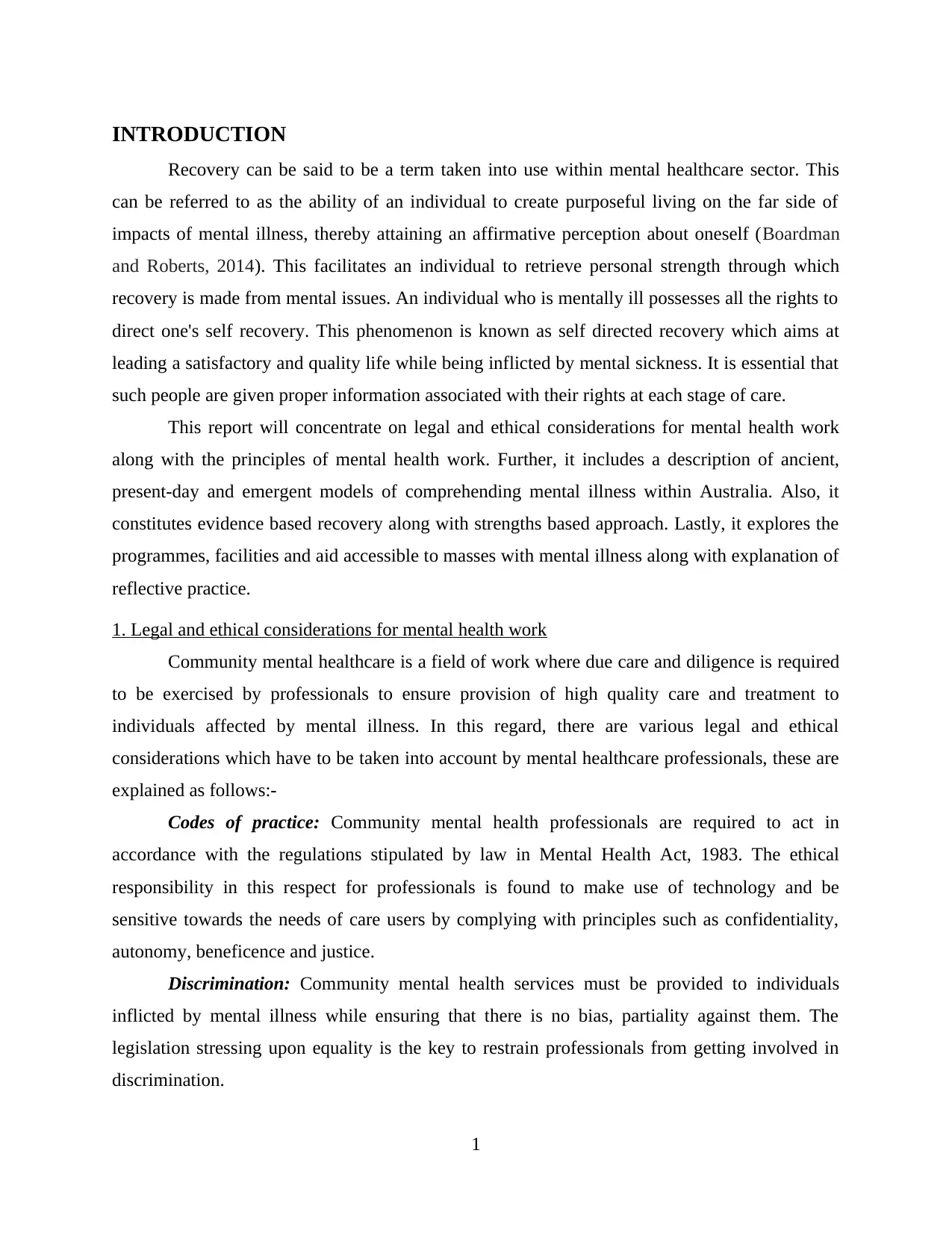
INTRODUCTION
Recovery can be said to be a term taken into use within mental healthcare sector. This
can be referred to as the ability of an individual to create purposeful living on the far side of
impacts of mental illness, thereby attaining an affirmative perception about oneself (Boardman
and Roberts, 2014). This facilitates an individual to retrieve personal strength through which
recovery is made from mental issues. An individual who is mentally ill possesses all the rights to
direct one's self recovery. This phenomenon is known as self directed recovery which aims at
leading a satisfactory and quality life while being inflicted by mental sickness. It is essential that
such people are given proper information associated with their rights at each stage of care.
This report will concentrate on legal and ethical considerations for mental health work
along with the principles of mental health work. Further, it includes a description of ancient,
present-day and emergent models of comprehending mental illness within Australia. Also, it
constitutes evidence based recovery along with strengths based approach. Lastly, it explores the
programmes, facilities and aid accessible to masses with mental illness along with explanation of
reflective practice.
1. Legal and ethical considerations for mental health work
Community mental healthcare is a field of work where due care and diligence is required
to be exercised by professionals to ensure provision of high quality care and treatment to
individuals affected by mental illness. In this regard, there are various legal and ethical
considerations which have to be taken into account by mental healthcare professionals, these are
explained as follows:-
Codes of practice: Community mental health professionals are required to act in
accordance with the regulations stipulated by law in Mental Health Act, 1983. The ethical
responsibility in this respect for professionals is found to make use of technology and be
sensitive towards the needs of care users by complying with principles such as confidentiality,
autonomy, beneficence and justice.
Discrimination: Community mental health services must be provided to individuals
inflicted by mental illness while ensuring that there is no bias, partiality against them. The
legislation stressing upon equality is the key to restrain professionals from getting involved in
discrimination.
1
Recovery can be said to be a term taken into use within mental healthcare sector. This
can be referred to as the ability of an individual to create purposeful living on the far side of
impacts of mental illness, thereby attaining an affirmative perception about oneself (Boardman
and Roberts, 2014). This facilitates an individual to retrieve personal strength through which
recovery is made from mental issues. An individual who is mentally ill possesses all the rights to
direct one's self recovery. This phenomenon is known as self directed recovery which aims at
leading a satisfactory and quality life while being inflicted by mental sickness. It is essential that
such people are given proper information associated with their rights at each stage of care.
This report will concentrate on legal and ethical considerations for mental health work
along with the principles of mental health work. Further, it includes a description of ancient,
present-day and emergent models of comprehending mental illness within Australia. Also, it
constitutes evidence based recovery along with strengths based approach. Lastly, it explores the
programmes, facilities and aid accessible to masses with mental illness along with explanation of
reflective practice.
1. Legal and ethical considerations for mental health work
Community mental healthcare is a field of work where due care and diligence is required
to be exercised by professionals to ensure provision of high quality care and treatment to
individuals affected by mental illness. In this regard, there are various legal and ethical
considerations which have to be taken into account by mental healthcare professionals, these are
explained as follows:-
Codes of practice: Community mental health professionals are required to act in
accordance with the regulations stipulated by law in Mental Health Act, 1983. The ethical
responsibility in this respect for professionals is found to make use of technology and be
sensitive towards the needs of care users by complying with principles such as confidentiality,
autonomy, beneficence and justice.
Discrimination: Community mental health services must be provided to individuals
inflicted by mental illness while ensuring that there is no bias, partiality against them. The
legislation stressing upon equality is the key to restrain professionals from getting involved in
discrimination.
1
⊘ This is a preview!⊘
Do you want full access?
Subscribe today to unlock all pages.

Trusted by 1+ million students worldwide
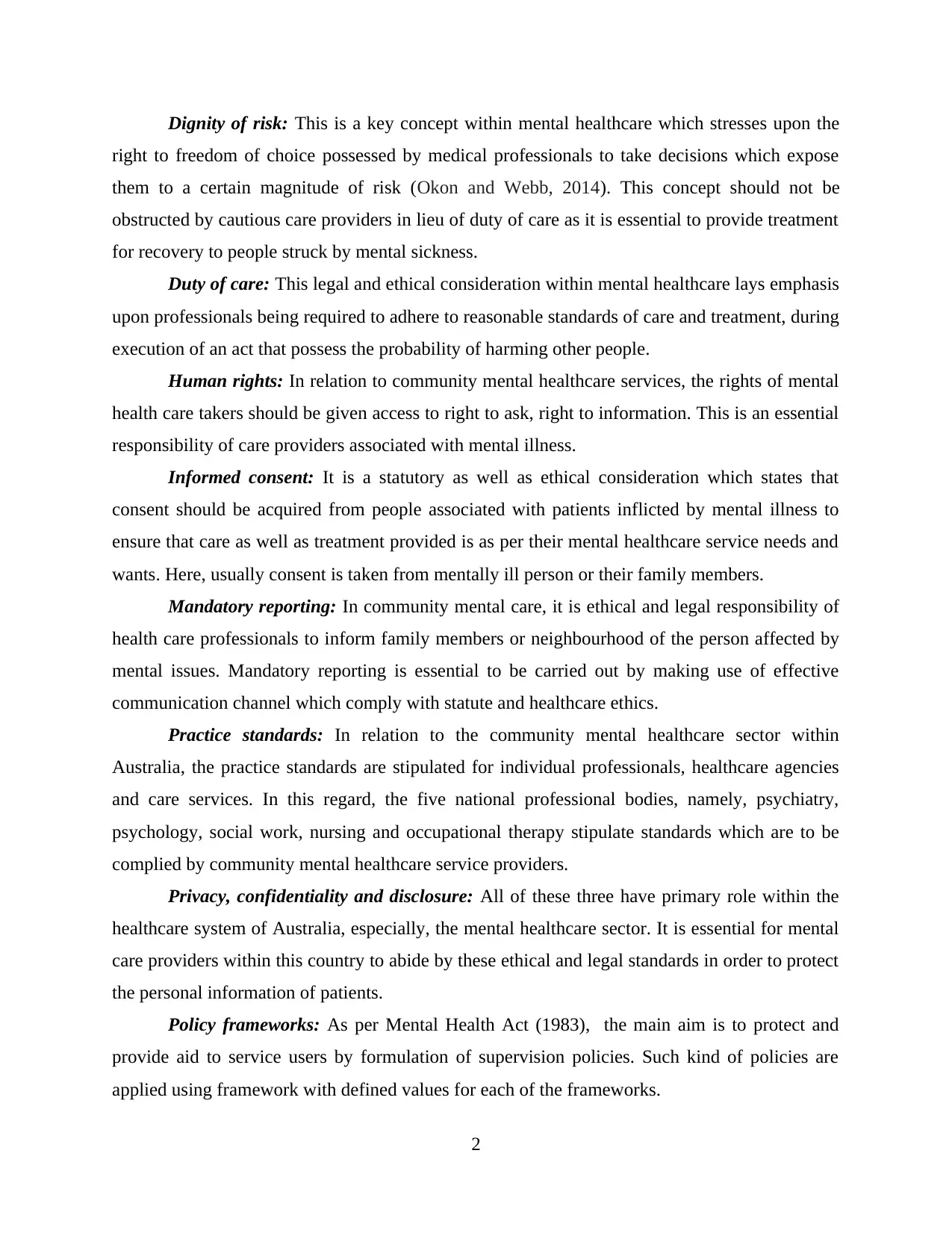
Dignity of risk: This is a key concept within mental healthcare which stresses upon the
right to freedom of choice possessed by medical professionals to take decisions which expose
them to a certain magnitude of risk (Okon and Webb, 2014). This concept should not be
obstructed by cautious care providers in lieu of duty of care as it is essential to provide treatment
for recovery to people struck by mental sickness.
Duty of care: This legal and ethical consideration within mental healthcare lays emphasis
upon professionals being required to adhere to reasonable standards of care and treatment, during
execution of an act that possess the probability of harming other people.
Human rights: In relation to community mental healthcare services, the rights of mental
health care takers should be given access to right to ask, right to information. This is an essential
responsibility of care providers associated with mental illness.
Informed consent: It is a statutory as well as ethical consideration which states that
consent should be acquired from people associated with patients inflicted by mental illness to
ensure that care as well as treatment provided is as per their mental healthcare service needs and
wants. Here, usually consent is taken from mentally ill person or their family members.
Mandatory reporting: In community mental care, it is ethical and legal responsibility of
health care professionals to inform family members or neighbourhood of the person affected by
mental issues. Mandatory reporting is essential to be carried out by making use of effective
communication channel which comply with statute and healthcare ethics.
Practice standards: In relation to the community mental healthcare sector within
Australia, the practice standards are stipulated for individual professionals, healthcare agencies
and care services. In this regard, the five national professional bodies, namely, psychiatry,
psychology, social work, nursing and occupational therapy stipulate standards which are to be
complied by community mental healthcare service providers.
Privacy, confidentiality and disclosure: All of these three have primary role within the
healthcare system of Australia, especially, the mental healthcare sector. It is essential for mental
care providers within this country to abide by these ethical and legal standards in order to protect
the personal information of patients.
Policy frameworks: As per Mental Health Act (1983), the main aim is to protect and
provide aid to service users by formulation of supervision policies. Such kind of policies are
applied using framework with defined values for each of the frameworks.
2
right to freedom of choice possessed by medical professionals to take decisions which expose
them to a certain magnitude of risk (Okon and Webb, 2014). This concept should not be
obstructed by cautious care providers in lieu of duty of care as it is essential to provide treatment
for recovery to people struck by mental sickness.
Duty of care: This legal and ethical consideration within mental healthcare lays emphasis
upon professionals being required to adhere to reasonable standards of care and treatment, during
execution of an act that possess the probability of harming other people.
Human rights: In relation to community mental healthcare services, the rights of mental
health care takers should be given access to right to ask, right to information. This is an essential
responsibility of care providers associated with mental illness.
Informed consent: It is a statutory as well as ethical consideration which states that
consent should be acquired from people associated with patients inflicted by mental illness to
ensure that care as well as treatment provided is as per their mental healthcare service needs and
wants. Here, usually consent is taken from mentally ill person or their family members.
Mandatory reporting: In community mental care, it is ethical and legal responsibility of
health care professionals to inform family members or neighbourhood of the person affected by
mental issues. Mandatory reporting is essential to be carried out by making use of effective
communication channel which comply with statute and healthcare ethics.
Practice standards: In relation to the community mental healthcare sector within
Australia, the practice standards are stipulated for individual professionals, healthcare agencies
and care services. In this regard, the five national professional bodies, namely, psychiatry,
psychology, social work, nursing and occupational therapy stipulate standards which are to be
complied by community mental healthcare service providers.
Privacy, confidentiality and disclosure: All of these three have primary role within the
healthcare system of Australia, especially, the mental healthcare sector. It is essential for mental
care providers within this country to abide by these ethical and legal standards in order to protect
the personal information of patients.
Policy frameworks: As per Mental Health Act (1983), the main aim is to protect and
provide aid to service users by formulation of supervision policies. Such kind of policies are
applied using framework with defined values for each of the frameworks.
2
Paraphrase This Document
Need a fresh take? Get an instant paraphrase of this document with our AI Paraphraser
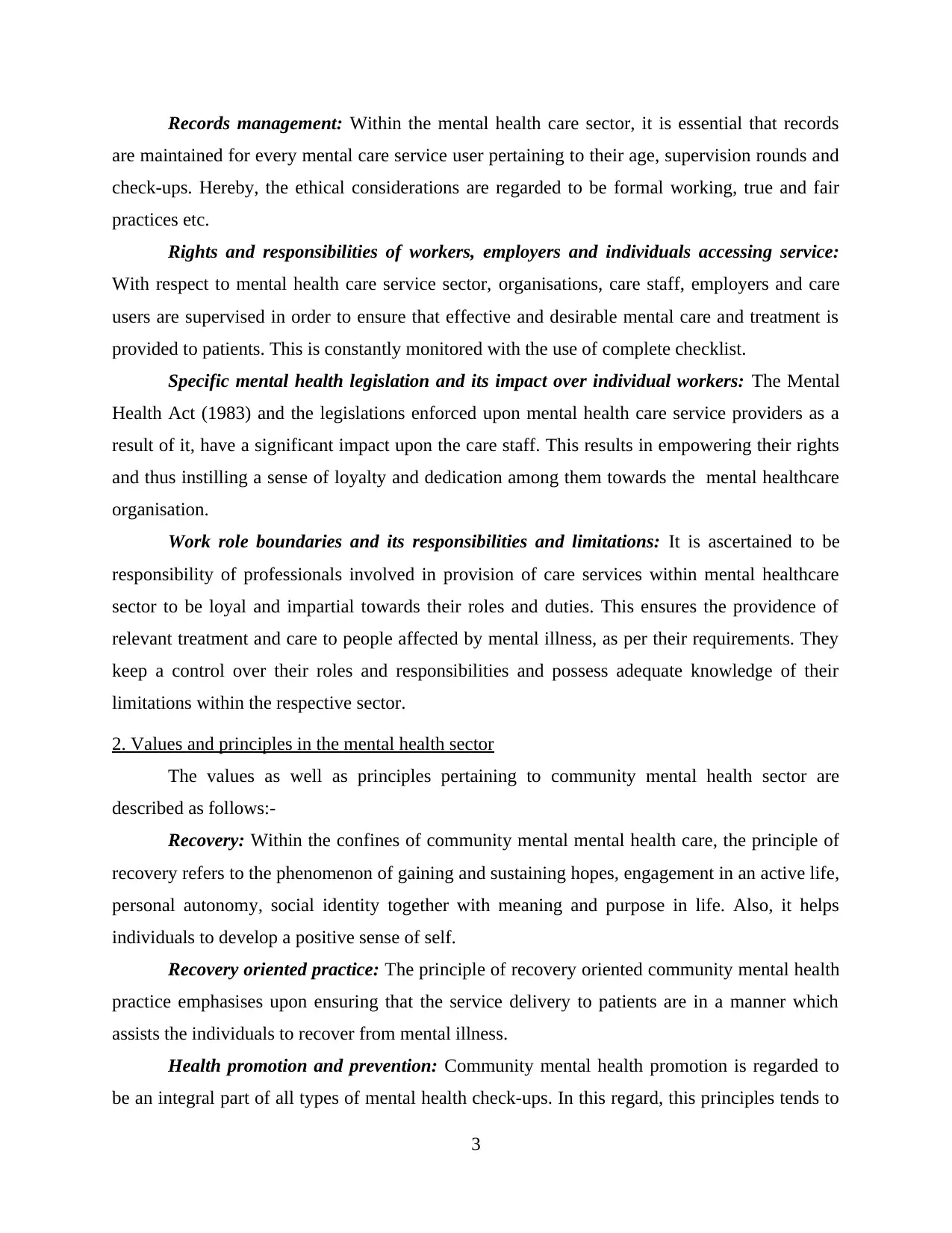
Records management: Within the mental health care sector, it is essential that records
are maintained for every mental care service user pertaining to their age, supervision rounds and
check-ups. Hereby, the ethical considerations are regarded to be formal working, true and fair
practices etc.
Rights and responsibilities of workers, employers and individuals accessing service:
With respect to mental health care service sector, organisations, care staff, employers and care
users are supervised in order to ensure that effective and desirable mental care and treatment is
provided to patients. This is constantly monitored with the use of complete checklist.
Specific mental health legislation and its impact over individual workers: The Mental
Health Act (1983) and the legislations enforced upon mental health care service providers as a
result of it, have a significant impact upon the care staff. This results in empowering their rights
and thus instilling a sense of loyalty and dedication among them towards the mental healthcare
organisation.
Work role boundaries and its responsibilities and limitations: It is ascertained to be
responsibility of professionals involved in provision of care services within mental healthcare
sector to be loyal and impartial towards their roles and duties. This ensures the providence of
relevant treatment and care to people affected by mental illness, as per their requirements. They
keep a control over their roles and responsibilities and possess adequate knowledge of their
limitations within the respective sector.
2. Values and principles in the mental health sector
The values as well as principles pertaining to community mental health sector are
described as follows:-
Recovery: Within the confines of community mental mental health care, the principle of
recovery refers to the phenomenon of gaining and sustaining hopes, engagement in an active life,
personal autonomy, social identity together with meaning and purpose in life. Also, it helps
individuals to develop a positive sense of self.
Recovery oriented practice: The principle of recovery oriented community mental health
practice emphasises upon ensuring that the service delivery to patients are in a manner which
assists the individuals to recover from mental illness.
Health promotion and prevention: Community mental health promotion is regarded to
be an integral part of all types of mental health check-ups. In this regard, this principles tends to
3
are maintained for every mental care service user pertaining to their age, supervision rounds and
check-ups. Hereby, the ethical considerations are regarded to be formal working, true and fair
practices etc.
Rights and responsibilities of workers, employers and individuals accessing service:
With respect to mental health care service sector, organisations, care staff, employers and care
users are supervised in order to ensure that effective and desirable mental care and treatment is
provided to patients. This is constantly monitored with the use of complete checklist.
Specific mental health legislation and its impact over individual workers: The Mental
Health Act (1983) and the legislations enforced upon mental health care service providers as a
result of it, have a significant impact upon the care staff. This results in empowering their rights
and thus instilling a sense of loyalty and dedication among them towards the mental healthcare
organisation.
Work role boundaries and its responsibilities and limitations: It is ascertained to be
responsibility of professionals involved in provision of care services within mental healthcare
sector to be loyal and impartial towards their roles and duties. This ensures the providence of
relevant treatment and care to people affected by mental illness, as per their requirements. They
keep a control over their roles and responsibilities and possess adequate knowledge of their
limitations within the respective sector.
2. Values and principles in the mental health sector
The values as well as principles pertaining to community mental health sector are
described as follows:-
Recovery: Within the confines of community mental mental health care, the principle of
recovery refers to the phenomenon of gaining and sustaining hopes, engagement in an active life,
personal autonomy, social identity together with meaning and purpose in life. Also, it helps
individuals to develop a positive sense of self.
Recovery oriented practice: The principle of recovery oriented community mental health
practice emphasises upon ensuring that the service delivery to patients are in a manner which
assists the individuals to recover from mental illness.
Health promotion and prevention: Community mental health promotion is regarded to
be an integral part of all types of mental health check-ups. In this regard, this principles tends to
3
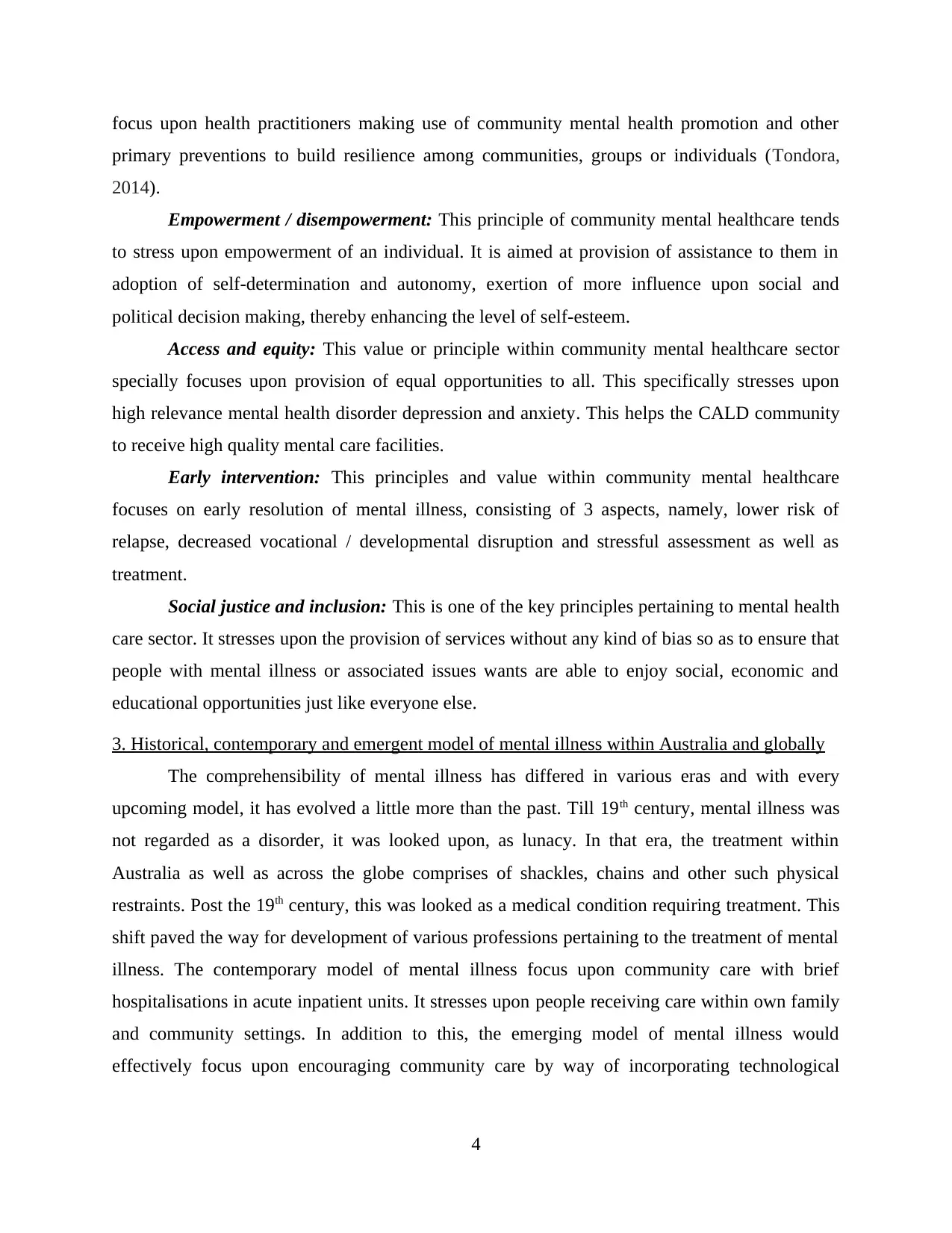
focus upon health practitioners making use of community mental health promotion and other
primary preventions to build resilience among communities, groups or individuals (Tondora,
2014).
Empowerment / disempowerment: This principle of community mental healthcare tends
to stress upon empowerment of an individual. It is aimed at provision of assistance to them in
adoption of self-determination and autonomy, exertion of more influence upon social and
political decision making, thereby enhancing the level of self-esteem.
Access and equity: This value or principle within community mental healthcare sector
specially focuses upon provision of equal opportunities to all. This specifically stresses upon
high relevance mental health disorder depression and anxiety. This helps the CALD community
to receive high quality mental care facilities.
Early intervention: This principles and value within community mental healthcare
focuses on early resolution of mental illness, consisting of 3 aspects, namely, lower risk of
relapse, decreased vocational / developmental disruption and stressful assessment as well as
treatment.
Social justice and inclusion: This is one of the key principles pertaining to mental health
care sector. It stresses upon the provision of services without any kind of bias so as to ensure that
people with mental illness or associated issues wants are able to enjoy social, economic and
educational opportunities just like everyone else.
3. Historical, contemporary and emergent model of mental illness within Australia and globally
The comprehensibility of mental illness has differed in various eras and with every
upcoming model, it has evolved a little more than the past. Till 19th century, mental illness was
not regarded as a disorder, it was looked upon, as lunacy. In that era, the treatment within
Australia as well as across the globe comprises of shackles, chains and other such physical
restraints. Post the 19th century, this was looked as a medical condition requiring treatment. This
shift paved the way for development of various professions pertaining to the treatment of mental
illness. The contemporary model of mental illness focus upon community care with brief
hospitalisations in acute inpatient units. It stresses upon people receiving care within own family
and community settings. In addition to this, the emerging model of mental illness would
effectively focus upon encouraging community care by way of incorporating technological
4
primary preventions to build resilience among communities, groups or individuals (Tondora,
2014).
Empowerment / disempowerment: This principle of community mental healthcare tends
to stress upon empowerment of an individual. It is aimed at provision of assistance to them in
adoption of self-determination and autonomy, exertion of more influence upon social and
political decision making, thereby enhancing the level of self-esteem.
Access and equity: This value or principle within community mental healthcare sector
specially focuses upon provision of equal opportunities to all. This specifically stresses upon
high relevance mental health disorder depression and anxiety. This helps the CALD community
to receive high quality mental care facilities.
Early intervention: This principles and value within community mental healthcare
focuses on early resolution of mental illness, consisting of 3 aspects, namely, lower risk of
relapse, decreased vocational / developmental disruption and stressful assessment as well as
treatment.
Social justice and inclusion: This is one of the key principles pertaining to mental health
care sector. It stresses upon the provision of services without any kind of bias so as to ensure that
people with mental illness or associated issues wants are able to enjoy social, economic and
educational opportunities just like everyone else.
3. Historical, contemporary and emergent model of mental illness within Australia and globally
The comprehensibility of mental illness has differed in various eras and with every
upcoming model, it has evolved a little more than the past. Till 19th century, mental illness was
not regarded as a disorder, it was looked upon, as lunacy. In that era, the treatment within
Australia as well as across the globe comprises of shackles, chains and other such physical
restraints. Post the 19th century, this was looked as a medical condition requiring treatment. This
shift paved the way for development of various professions pertaining to the treatment of mental
illness. The contemporary model of mental illness focus upon community care with brief
hospitalisations in acute inpatient units. It stresses upon people receiving care within own family
and community settings. In addition to this, the emerging model of mental illness would
effectively focus upon encouraging community care by way of incorporating technological
4
⊘ This is a preview!⊘
Do you want full access?
Subscribe today to unlock all pages.

Trusted by 1+ million students worldwide
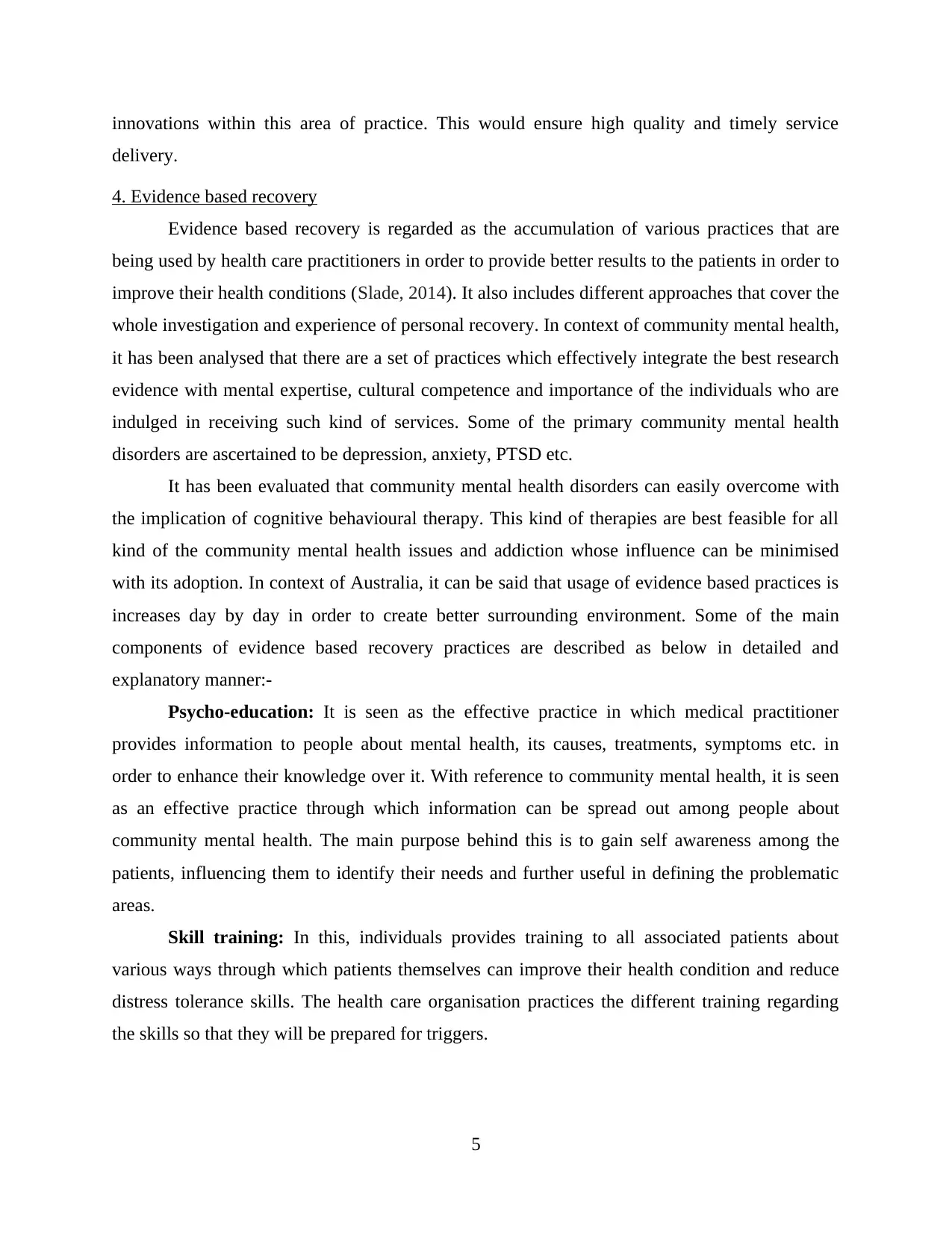
innovations within this area of practice. This would ensure high quality and timely service
delivery.
4. Evidence based recovery
Evidence based recovery is regarded as the accumulation of various practices that are
being used by health care practitioners in order to provide better results to the patients in order to
improve their health conditions (Slade, 2014). It also includes different approaches that cover the
whole investigation and experience of personal recovery. In context of community mental health,
it has been analysed that there are a set of practices which effectively integrate the best research
evidence with mental expertise, cultural competence and importance of the individuals who are
indulged in receiving such kind of services. Some of the primary community mental health
disorders are ascertained to be depression, anxiety, PTSD etc.
It has been evaluated that community mental health disorders can easily overcome with
the implication of cognitive behavioural therapy. This kind of therapies are best feasible for all
kind of the community mental health issues and addiction whose influence can be minimised
with its adoption. In context of Australia, it can be said that usage of evidence based practices is
increases day by day in order to create better surrounding environment. Some of the main
components of evidence based recovery practices are described as below in detailed and
explanatory manner:-
Psycho-education: It is seen as the effective practice in which medical practitioner
provides information to people about mental health, its causes, treatments, symptoms etc. in
order to enhance their knowledge over it. With reference to community mental health, it is seen
as an effective practice through which information can be spread out among people about
community mental health. The main purpose behind this is to gain self awareness among the
patients, influencing them to identify their needs and further useful in defining the problematic
areas.
Skill training: In this, individuals provides training to all associated patients about
various ways through which patients themselves can improve their health condition and reduce
distress tolerance skills. The health care organisation practices the different training regarding
the skills so that they will be prepared for triggers.
5
delivery.
4. Evidence based recovery
Evidence based recovery is regarded as the accumulation of various practices that are
being used by health care practitioners in order to provide better results to the patients in order to
improve their health conditions (Slade, 2014). It also includes different approaches that cover the
whole investigation and experience of personal recovery. In context of community mental health,
it has been analysed that there are a set of practices which effectively integrate the best research
evidence with mental expertise, cultural competence and importance of the individuals who are
indulged in receiving such kind of services. Some of the primary community mental health
disorders are ascertained to be depression, anxiety, PTSD etc.
It has been evaluated that community mental health disorders can easily overcome with
the implication of cognitive behavioural therapy. This kind of therapies are best feasible for all
kind of the community mental health issues and addiction whose influence can be minimised
with its adoption. In context of Australia, it can be said that usage of evidence based practices is
increases day by day in order to create better surrounding environment. Some of the main
components of evidence based recovery practices are described as below in detailed and
explanatory manner:-
Psycho-education: It is seen as the effective practice in which medical practitioner
provides information to people about mental health, its causes, treatments, symptoms etc. in
order to enhance their knowledge over it. With reference to community mental health, it is seen
as an effective practice through which information can be spread out among people about
community mental health. The main purpose behind this is to gain self awareness among the
patients, influencing them to identify their needs and further useful in defining the problematic
areas.
Skill training: In this, individuals provides training to all associated patients about
various ways through which patients themselves can improve their health condition and reduce
distress tolerance skills. The health care organisation practices the different training regarding
the skills so that they will be prepared for triggers.
5
Paraphrase This Document
Need a fresh take? Get an instant paraphrase of this document with our AI Paraphraser
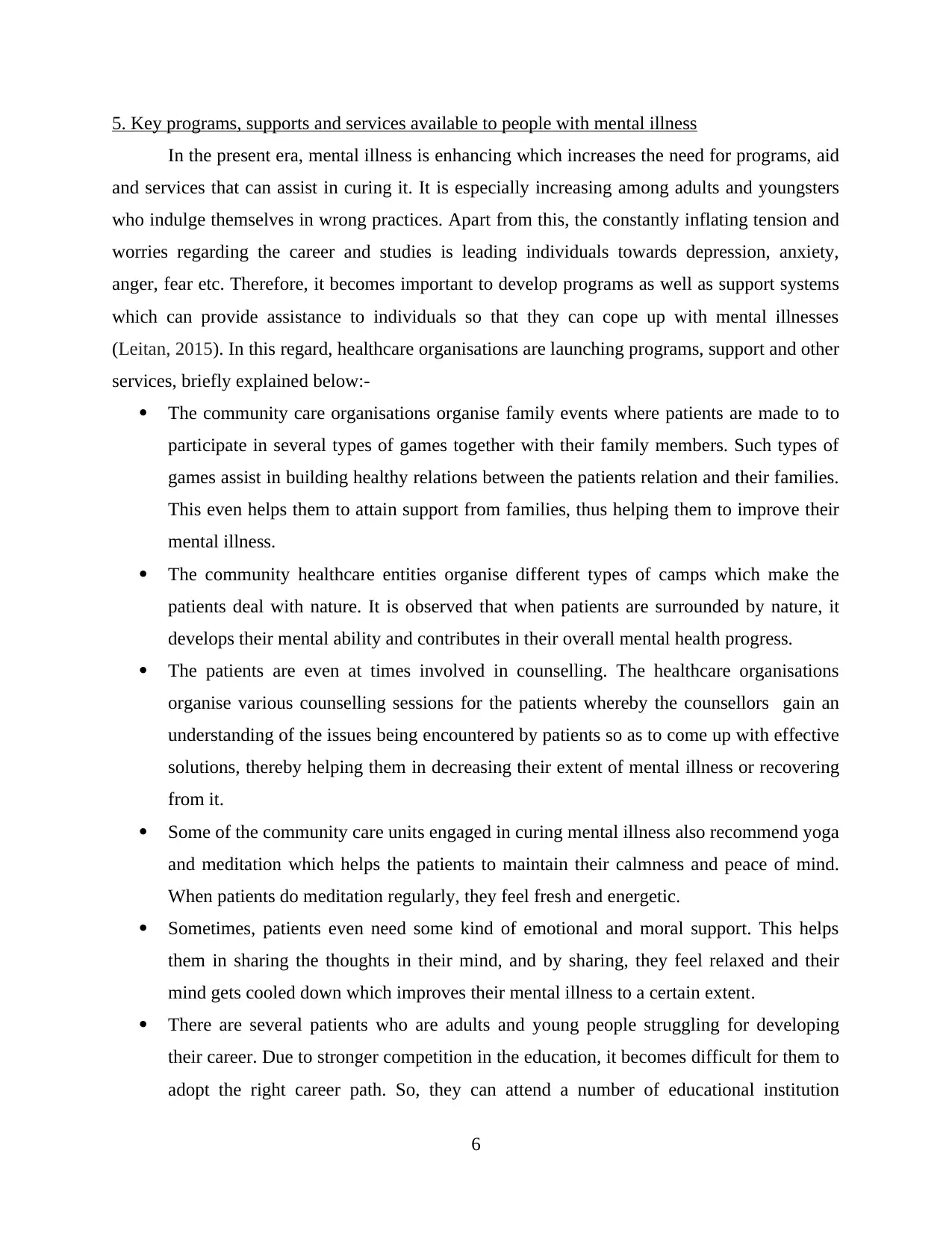
5. Key programs, supports and services available to people with mental illness
In the present era, mental illness is enhancing which increases the need for programs, aid
and services that can assist in curing it. It is especially increasing among adults and youngsters
who indulge themselves in wrong practices. Apart from this, the constantly inflating tension and
worries regarding the career and studies is leading individuals towards depression, anxiety,
anger, fear etc. Therefore, it becomes important to develop programs as well as support systems
which can provide assistance to individuals so that they can cope up with mental illnesses
(Leitan, 2015). In this regard, healthcare organisations are launching programs, support and other
services, briefly explained below:-
The community care organisations organise family events where patients are made to to
participate in several types of games together with their family members. Such types of
games assist in building healthy relations between the patients relation and their families.
This even helps them to attain support from families, thus helping them to improve their
mental illness.
The community healthcare entities organise different types of camps which make the
patients deal with nature. It is observed that when patients are surrounded by nature, it
develops their mental ability and contributes in their overall mental health progress.
The patients are even at times involved in counselling. The healthcare organisations
organise various counselling sessions for the patients whereby the counsellors gain an
understanding of the issues being encountered by patients so as to come up with effective
solutions, thereby helping them in decreasing their extent of mental illness or recovering
from it.
Some of the community care units engaged in curing mental illness also recommend yoga
and meditation which helps the patients to maintain their calmness and peace of mind.
When patients do meditation regularly, they feel fresh and energetic.
Sometimes, patients even need some kind of emotional and moral support. This helps
them in sharing the thoughts in their mind, and by sharing, they feel relaxed and their
mind gets cooled down which improves their mental illness to a certain extent.
There are several patients who are adults and young people struggling for developing
their career. Due to stronger competition in the education, it becomes difficult for them to
adopt the right career path. So, they can attend a number of educational institution
6
In the present era, mental illness is enhancing which increases the need for programs, aid
and services that can assist in curing it. It is especially increasing among adults and youngsters
who indulge themselves in wrong practices. Apart from this, the constantly inflating tension and
worries regarding the career and studies is leading individuals towards depression, anxiety,
anger, fear etc. Therefore, it becomes important to develop programs as well as support systems
which can provide assistance to individuals so that they can cope up with mental illnesses
(Leitan, 2015). In this regard, healthcare organisations are launching programs, support and other
services, briefly explained below:-
The community care organisations organise family events where patients are made to to
participate in several types of games together with their family members. Such types of
games assist in building healthy relations between the patients relation and their families.
This even helps them to attain support from families, thus helping them to improve their
mental illness.
The community healthcare entities organise different types of camps which make the
patients deal with nature. It is observed that when patients are surrounded by nature, it
develops their mental ability and contributes in their overall mental health progress.
The patients are even at times involved in counselling. The healthcare organisations
organise various counselling sessions for the patients whereby the counsellors gain an
understanding of the issues being encountered by patients so as to come up with effective
solutions, thereby helping them in decreasing their extent of mental illness or recovering
from it.
Some of the community care units engaged in curing mental illness also recommend yoga
and meditation which helps the patients to maintain their calmness and peace of mind.
When patients do meditation regularly, they feel fresh and energetic.
Sometimes, patients even need some kind of emotional and moral support. This helps
them in sharing the thoughts in their mind, and by sharing, they feel relaxed and their
mind gets cooled down which improves their mental illness to a certain extent.
There are several patients who are adults and young people struggling for developing
their career. Due to stronger competition in the education, it becomes difficult for them to
adopt the right career path. So, they can attend a number of educational institution
6
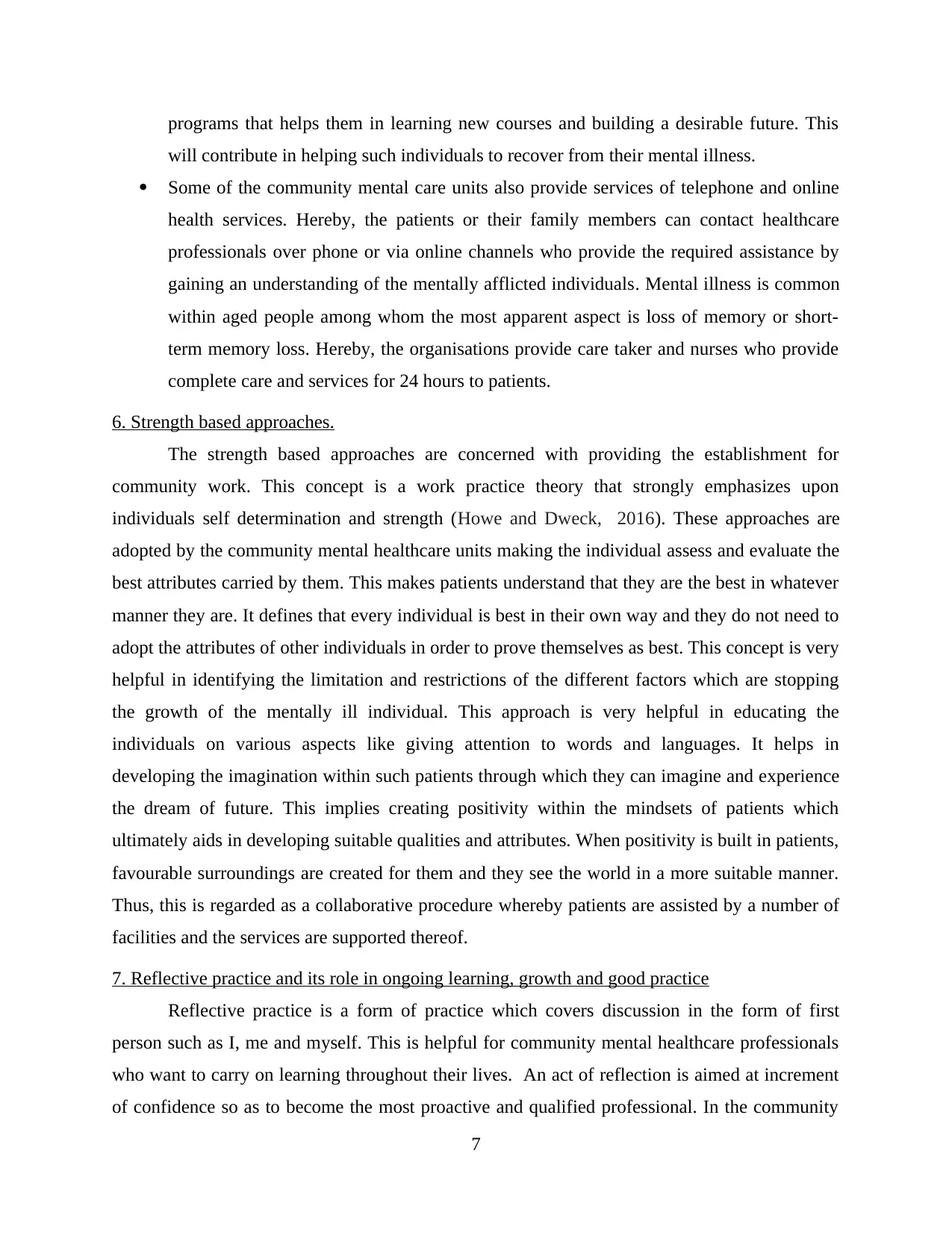
programs that helps them in learning new courses and building a desirable future. This
will contribute in helping such individuals to recover from their mental illness.
Some of the community mental care units also provide services of telephone and online
health services. Hereby, the patients or their family members can contact healthcare
professionals over phone or via online channels who provide the required assistance by
gaining an understanding of the mentally afflicted individuals. Mental illness is common
within aged people among whom the most apparent aspect is loss of memory or short-
term memory loss. Hereby, the organisations provide care taker and nurses who provide
complete care and services for 24 hours to patients.
6. Strength based approaches.
The strength based approaches are concerned with providing the establishment for
community work. This concept is a work practice theory that strongly emphasizes upon
individuals self determination and strength (Howe and Dweck, 2016). These approaches are
adopted by the community mental healthcare units making the individual assess and evaluate the
best attributes carried by them. This makes patients understand that they are the best in whatever
manner they are. It defines that every individual is best in their own way and they do not need to
adopt the attributes of other individuals in order to prove themselves as best. This concept is very
helpful in identifying the limitation and restrictions of the different factors which are stopping
the growth of the mentally ill individual. This approach is very helpful in educating the
individuals on various aspects like giving attention to words and languages. It helps in
developing the imagination within such patients through which they can imagine and experience
the dream of future. This implies creating positivity within the mindsets of patients which
ultimately aids in developing suitable qualities and attributes. When positivity is built in patients,
favourable surroundings are created for them and they see the world in a more suitable manner.
Thus, this is regarded as a collaborative procedure whereby patients are assisted by a number of
facilities and the services are supported thereof.
7. Reflective practice and its role in ongoing learning, growth and good practice
Reflective practice is a form of practice which covers discussion in the form of first
person such as I, me and myself. This is helpful for community mental healthcare professionals
who want to carry on learning throughout their lives. An act of reflection is aimed at increment
of confidence so as to become the most proactive and qualified professional. In the community
7
will contribute in helping such individuals to recover from their mental illness.
Some of the community mental care units also provide services of telephone and online
health services. Hereby, the patients or their family members can contact healthcare
professionals over phone or via online channels who provide the required assistance by
gaining an understanding of the mentally afflicted individuals. Mental illness is common
within aged people among whom the most apparent aspect is loss of memory or short-
term memory loss. Hereby, the organisations provide care taker and nurses who provide
complete care and services for 24 hours to patients.
6. Strength based approaches.
The strength based approaches are concerned with providing the establishment for
community work. This concept is a work practice theory that strongly emphasizes upon
individuals self determination and strength (Howe and Dweck, 2016). These approaches are
adopted by the community mental healthcare units making the individual assess and evaluate the
best attributes carried by them. This makes patients understand that they are the best in whatever
manner they are. It defines that every individual is best in their own way and they do not need to
adopt the attributes of other individuals in order to prove themselves as best. This concept is very
helpful in identifying the limitation and restrictions of the different factors which are stopping
the growth of the mentally ill individual. This approach is very helpful in educating the
individuals on various aspects like giving attention to words and languages. It helps in
developing the imagination within such patients through which they can imagine and experience
the dream of future. This implies creating positivity within the mindsets of patients which
ultimately aids in developing suitable qualities and attributes. When positivity is built in patients,
favourable surroundings are created for them and they see the world in a more suitable manner.
Thus, this is regarded as a collaborative procedure whereby patients are assisted by a number of
facilities and the services are supported thereof.
7. Reflective practice and its role in ongoing learning, growth and good practice
Reflective practice is a form of practice which covers discussion in the form of first
person such as I, me and myself. This is helpful for community mental healthcare professionals
who want to carry on learning throughout their lives. An act of reflection is aimed at increment
of confidence so as to become the most proactive and qualified professional. In the community
7
⊘ This is a preview!⊘
Do you want full access?
Subscribe today to unlock all pages.

Trusted by 1+ million students worldwide
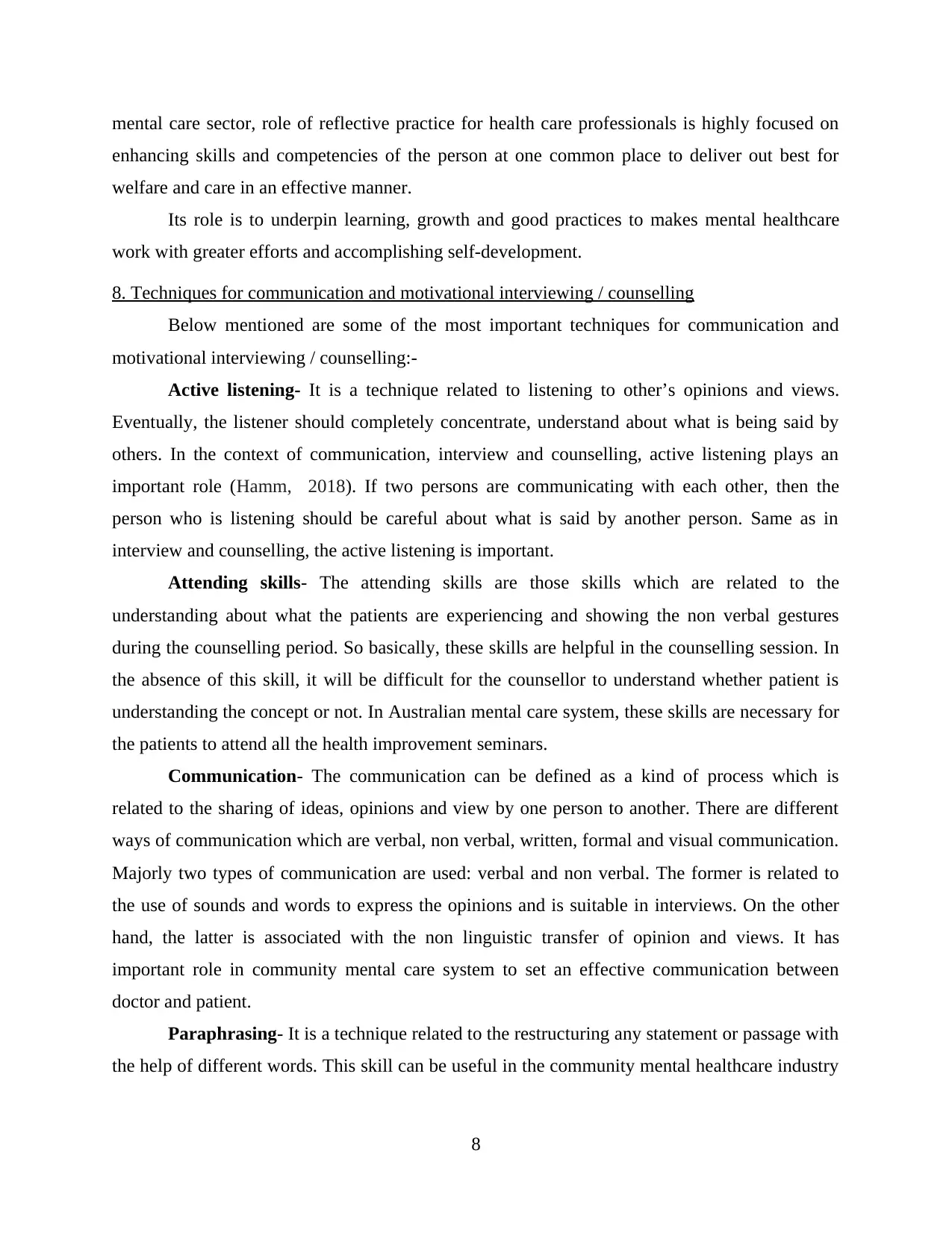
mental care sector, role of reflective practice for health care professionals is highly focused on
enhancing skills and competencies of the person at one common place to deliver out best for
welfare and care in an effective manner.
Its role is to underpin learning, growth and good practices to makes mental healthcare
work with greater efforts and accomplishing self-development.
8. Techniques for communication and motivational interviewing / counselling
Below mentioned are some of the most important techniques for communication and
motivational interviewing / counselling:-
Active listening- It is a technique related to listening to other’s opinions and views.
Eventually, the listener should completely concentrate, understand about what is being said by
others. In the context of communication, interview and counselling, active listening plays an
important role (Hamm, 2018). If two persons are communicating with each other, then the
person who is listening should be careful about what is said by another person. Same as in
interview and counselling, the active listening is important.
Attending skills- The attending skills are those skills which are related to the
understanding about what the patients are experiencing and showing the non verbal gestures
during the counselling period. So basically, these skills are helpful in the counselling session. In
the absence of this skill, it will be difficult for the counsellor to understand whether patient is
understanding the concept or not. In Australian mental care system, these skills are necessary for
the patients to attend all the health improvement seminars.
Communication- The communication can be defined as a kind of process which is
related to the sharing of ideas, opinions and view by one person to another. There are different
ways of communication which are verbal, non verbal, written, formal and visual communication.
Majorly two types of communication are used: verbal and non verbal. The former is related to
the use of sounds and words to express the opinions and is suitable in interviews. On the other
hand, the latter is associated with the non linguistic transfer of opinion and views. It has
important role in community mental care system to set an effective communication between
doctor and patient.
Paraphrasing- It is a technique related to the restructuring any statement or passage with
the help of different words. This skill can be useful in the community mental healthcare industry
8
enhancing skills and competencies of the person at one common place to deliver out best for
welfare and care in an effective manner.
Its role is to underpin learning, growth and good practices to makes mental healthcare
work with greater efforts and accomplishing self-development.
8. Techniques for communication and motivational interviewing / counselling
Below mentioned are some of the most important techniques for communication and
motivational interviewing / counselling:-
Active listening- It is a technique related to listening to other’s opinions and views.
Eventually, the listener should completely concentrate, understand about what is being said by
others. In the context of communication, interview and counselling, active listening plays an
important role (Hamm, 2018). If two persons are communicating with each other, then the
person who is listening should be careful about what is said by another person. Same as in
interview and counselling, the active listening is important.
Attending skills- The attending skills are those skills which are related to the
understanding about what the patients are experiencing and showing the non verbal gestures
during the counselling period. So basically, these skills are helpful in the counselling session. In
the absence of this skill, it will be difficult for the counsellor to understand whether patient is
understanding the concept or not. In Australian mental care system, these skills are necessary for
the patients to attend all the health improvement seminars.
Communication- The communication can be defined as a kind of process which is
related to the sharing of ideas, opinions and view by one person to another. There are different
ways of communication which are verbal, non verbal, written, formal and visual communication.
Majorly two types of communication are used: verbal and non verbal. The former is related to
the use of sounds and words to express the opinions and is suitable in interviews. On the other
hand, the latter is associated with the non linguistic transfer of opinion and views. It has
important role in community mental care system to set an effective communication between
doctor and patient.
Paraphrasing- It is a technique related to the restructuring any statement or passage with
the help of different words. This skill can be useful in the community mental healthcare industry
8
Paraphrase This Document
Need a fresh take? Get an instant paraphrase of this document with our AI Paraphraser
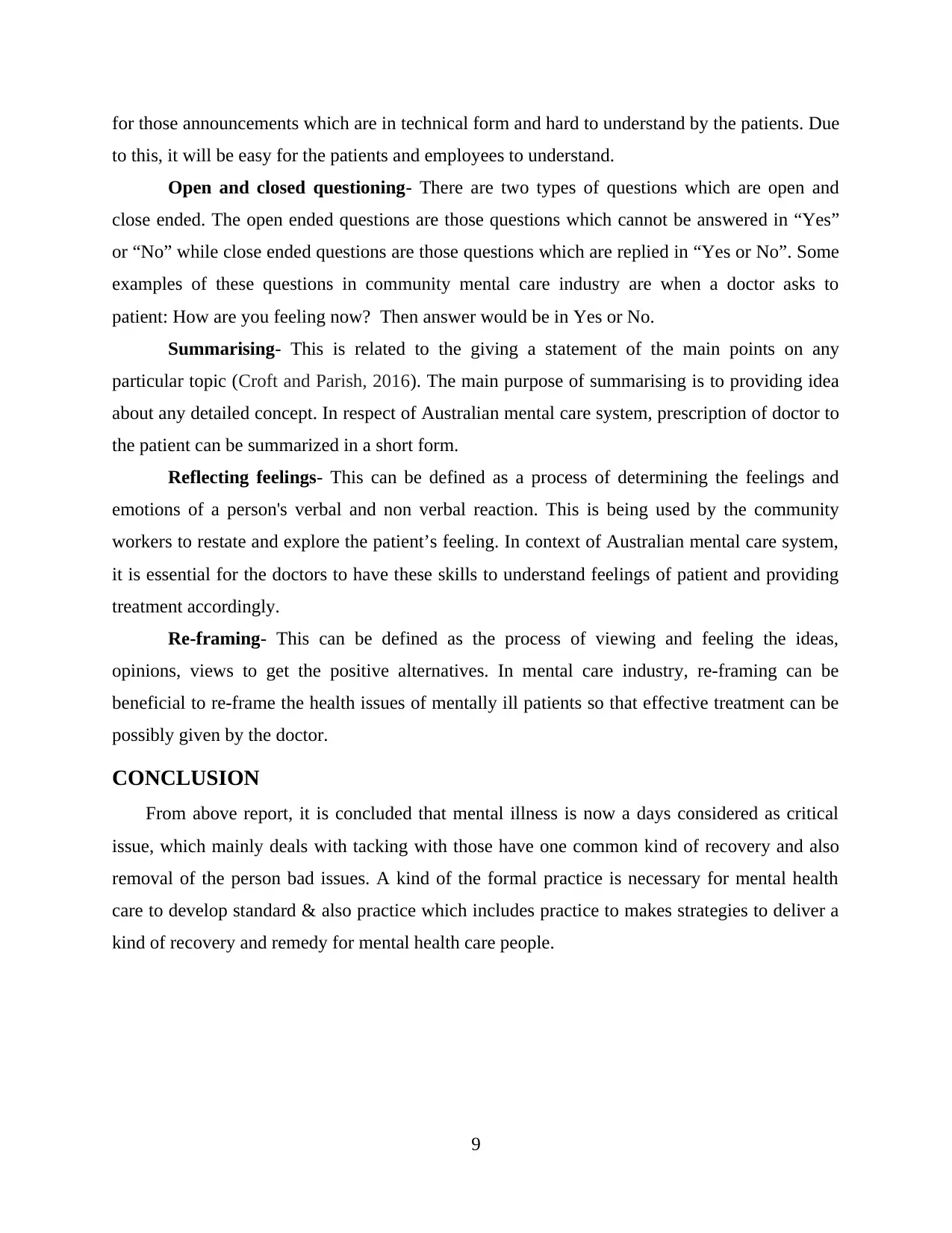
for those announcements which are in technical form and hard to understand by the patients. Due
to this, it will be easy for the patients and employees to understand.
Open and closed questioning- There are two types of questions which are open and
close ended. The open ended questions are those questions which cannot be answered in “Yes”
or “No” while close ended questions are those questions which are replied in “Yes or No”. Some
examples of these questions in community mental care industry are when a doctor asks to
patient: How are you feeling now? Then answer would be in Yes or No.
Summarising- This is related to the giving a statement of the main points on any
particular topic (Croft and Parish, 2016). The main purpose of summarising is to providing idea
about any detailed concept. In respect of Australian mental care system, prescription of doctor to
the patient can be summarized in a short form.
Reflecting feelings- This can be defined as a process of determining the feelings and
emotions of a person's verbal and non verbal reaction. This is being used by the community
workers to restate and explore the patient’s feeling. In context of Australian mental care system,
it is essential for the doctors to have these skills to understand feelings of patient and providing
treatment accordingly.
Re-framing- This can be defined as the process of viewing and feeling the ideas,
opinions, views to get the positive alternatives. In mental care industry, re-framing can be
beneficial to re-frame the health issues of mentally ill patients so that effective treatment can be
possibly given by the doctor.
CONCLUSION
From above report, it is concluded that mental illness is now a days considered as critical
issue, which mainly deals with tacking with those have one common kind of recovery and also
removal of the person bad issues. A kind of the formal practice is necessary for mental health
care to develop standard & also practice which includes practice to makes strategies to deliver a
kind of recovery and remedy for mental health care people.
9
to this, it will be easy for the patients and employees to understand.
Open and closed questioning- There are two types of questions which are open and
close ended. The open ended questions are those questions which cannot be answered in “Yes”
or “No” while close ended questions are those questions which are replied in “Yes or No”. Some
examples of these questions in community mental care industry are when a doctor asks to
patient: How are you feeling now? Then answer would be in Yes or No.
Summarising- This is related to the giving a statement of the main points on any
particular topic (Croft and Parish, 2016). The main purpose of summarising is to providing idea
about any detailed concept. In respect of Australian mental care system, prescription of doctor to
the patient can be summarized in a short form.
Reflecting feelings- This can be defined as a process of determining the feelings and
emotions of a person's verbal and non verbal reaction. This is being used by the community
workers to restate and explore the patient’s feeling. In context of Australian mental care system,
it is essential for the doctors to have these skills to understand feelings of patient and providing
treatment accordingly.
Re-framing- This can be defined as the process of viewing and feeling the ideas,
opinions, views to get the positive alternatives. In mental care industry, re-framing can be
beneficial to re-frame the health issues of mentally ill patients so that effective treatment can be
possibly given by the doctor.
CONCLUSION
From above report, it is concluded that mental illness is now a days considered as critical
issue, which mainly deals with tacking with those have one common kind of recovery and also
removal of the person bad issues. A kind of the formal practice is necessary for mental health
care to develop standard & also practice which includes practice to makes strategies to deliver a
kind of recovery and remedy for mental health care people.
9
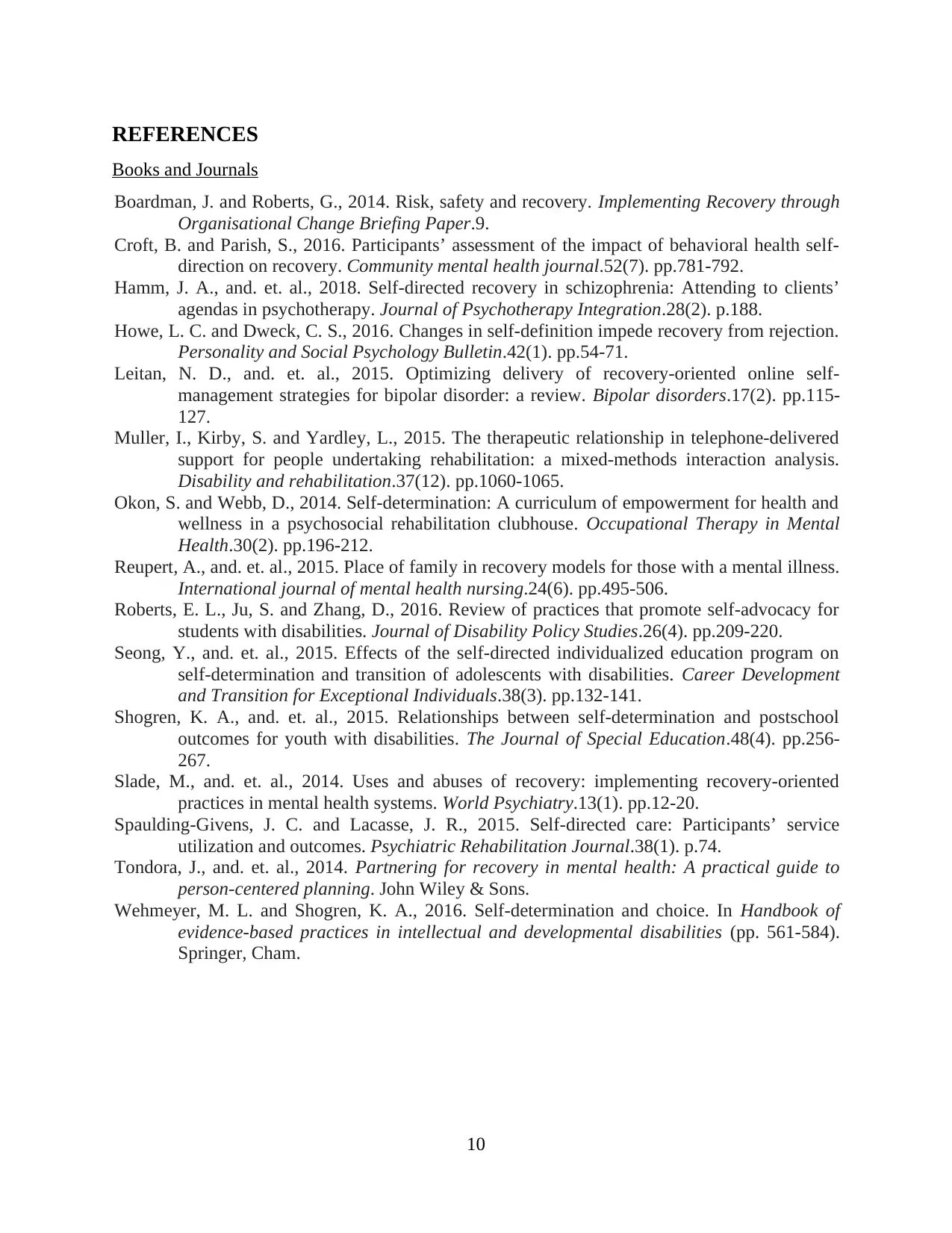
REFERENCES
Books and Journals
Boardman, J. and Roberts, G., 2014. Risk, safety and recovery. Implementing Recovery through
Organisational Change Briefing Paper.9.
Croft, B. and Parish, S., 2016. Participants’ assessment of the impact of behavioral health self-
direction on recovery. Community mental health journal.52(7). pp.781-792.
Hamm, J. A., and. et. al., 2018. Self-directed recovery in schizophrenia: Attending to clients’
agendas in psychotherapy. Journal of Psychotherapy Integration.28(2). p.188.
Howe, L. C. and Dweck, C. S., 2016. Changes in self-definition impede recovery from rejection.
Personality and Social Psychology Bulletin.42(1). pp.54-71.
Leitan, N. D., and. et. al., 2015. Optimizing delivery of recovery‐oriented online self‐
management strategies for bipolar disorder: a review. Bipolar disorders.17(2). pp.115-
127.
Muller, I., Kirby, S. and Yardley, L., 2015. The therapeutic relationship in telephone-delivered
support for people undertaking rehabilitation: a mixed-methods interaction analysis.
Disability and rehabilitation.37(12). pp.1060-1065.
Okon, S. and Webb, D., 2014. Self-determination: A curriculum of empowerment for health and
wellness in a psychosocial rehabilitation clubhouse. Occupational Therapy in Mental
Health.30(2). pp.196-212.
Reupert, A., and. et. al., 2015. Place of family in recovery models for those with a mental illness.
International journal of mental health nursing.24(6). pp.495-506.
Roberts, E. L., Ju, S. and Zhang, D., 2016. Review of practices that promote self-advocacy for
students with disabilities. Journal of Disability Policy Studies.26(4). pp.209-220.
Seong, Y., and. et. al., 2015. Effects of the self-directed individualized education program on
self-determination and transition of adolescents with disabilities. Career Development
and Transition for Exceptional Individuals.38(3). pp.132-141.
Shogren, K. A., and. et. al., 2015. Relationships between self-determination and postschool
outcomes for youth with disabilities. The Journal of Special Education.48(4). pp.256-
267.
Slade, M., and. et. al., 2014. Uses and abuses of recovery: implementing recovery‐oriented
practices in mental health systems. World Psychiatry.13(1). pp.12-20.
Spaulding-Givens, J. C. and Lacasse, J. R., 2015. Self-directed care: Participants’ service
utilization and outcomes. Psychiatric Rehabilitation Journal.38(1). p.74.
Tondora, J., and. et. al., 2014. Partnering for recovery in mental health: A practical guide to
person-centered planning. John Wiley & Sons.
Wehmeyer, M. L. and Shogren, K. A., 2016. Self-determination and choice. In Handbook of
evidence-based practices in intellectual and developmental disabilities (pp. 561-584).
Springer, Cham.
10
Books and Journals
Boardman, J. and Roberts, G., 2014. Risk, safety and recovery. Implementing Recovery through
Organisational Change Briefing Paper.9.
Croft, B. and Parish, S., 2016. Participants’ assessment of the impact of behavioral health self-
direction on recovery. Community mental health journal.52(7). pp.781-792.
Hamm, J. A., and. et. al., 2018. Self-directed recovery in schizophrenia: Attending to clients’
agendas in psychotherapy. Journal of Psychotherapy Integration.28(2). p.188.
Howe, L. C. and Dweck, C. S., 2016. Changes in self-definition impede recovery from rejection.
Personality and Social Psychology Bulletin.42(1). pp.54-71.
Leitan, N. D., and. et. al., 2015. Optimizing delivery of recovery‐oriented online self‐
management strategies for bipolar disorder: a review. Bipolar disorders.17(2). pp.115-
127.
Muller, I., Kirby, S. and Yardley, L., 2015. The therapeutic relationship in telephone-delivered
support for people undertaking rehabilitation: a mixed-methods interaction analysis.
Disability and rehabilitation.37(12). pp.1060-1065.
Okon, S. and Webb, D., 2014. Self-determination: A curriculum of empowerment for health and
wellness in a psychosocial rehabilitation clubhouse. Occupational Therapy in Mental
Health.30(2). pp.196-212.
Reupert, A., and. et. al., 2015. Place of family in recovery models for those with a mental illness.
International journal of mental health nursing.24(6). pp.495-506.
Roberts, E. L., Ju, S. and Zhang, D., 2016. Review of practices that promote self-advocacy for
students with disabilities. Journal of Disability Policy Studies.26(4). pp.209-220.
Seong, Y., and. et. al., 2015. Effects of the self-directed individualized education program on
self-determination and transition of adolescents with disabilities. Career Development
and Transition for Exceptional Individuals.38(3). pp.132-141.
Shogren, K. A., and. et. al., 2015. Relationships between self-determination and postschool
outcomes for youth with disabilities. The Journal of Special Education.48(4). pp.256-
267.
Slade, M., and. et. al., 2014. Uses and abuses of recovery: implementing recovery‐oriented
practices in mental health systems. World Psychiatry.13(1). pp.12-20.
Spaulding-Givens, J. C. and Lacasse, J. R., 2015. Self-directed care: Participants’ service
utilization and outcomes. Psychiatric Rehabilitation Journal.38(1). p.74.
Tondora, J., and. et. al., 2014. Partnering for recovery in mental health: A practical guide to
person-centered planning. John Wiley & Sons.
Wehmeyer, M. L. and Shogren, K. A., 2016. Self-determination and choice. In Handbook of
evidence-based practices in intellectual and developmental disabilities (pp. 561-584).
Springer, Cham.
10
⊘ This is a preview!⊘
Do you want full access?
Subscribe today to unlock all pages.

Trusted by 1+ million students worldwide
1 out of 12
Related Documents
Your All-in-One AI-Powered Toolkit for Academic Success.
+13062052269
info@desklib.com
Available 24*7 on WhatsApp / Email
![[object Object]](/_next/static/media/star-bottom.7253800d.svg)
Unlock your academic potential
Copyright © 2020–2026 A2Z Services. All Rights Reserved. Developed and managed by ZUCOL.





